#I loved the internal conflict becoming external
Explore tagged Tumblr posts
Text
How Blitz and Stolas figure out how they feel: external vs. internal processing
I've been in therapy a ton (feeling like I'm not alone in that in this fandom), and one of the things I've learned from it is that I like to process my thoughts and feelings externally- by talking about them. It turns out not everyone is like that. I'm like Blitz in this way.
I first got on this topic when I was thinking about how Blitz flip flops in Apology Tour. When he goes to see Stolas at the beginning of the episode, he goes in with an idea he's trying out- a narrative he's committed to FOR NOW, insisting that he's there to reinstate the full moon deal with TONS of undue and shaky confidence.
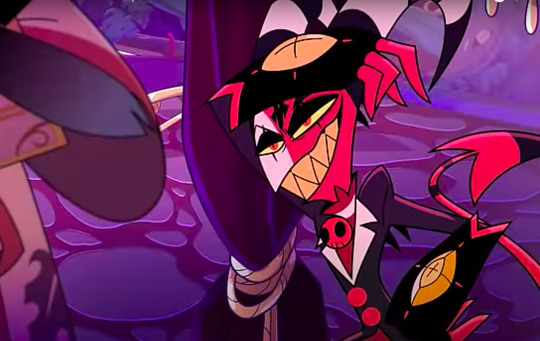
Is this plan something he's actually confident in? Absolutely not. But he's going to commit to it damnit and see how it plays out. Does he believe it? I think he does in the moment. He's convinced himself anyway, and when Stolas wears him down and he understands that he's not doing himself any favors . . .
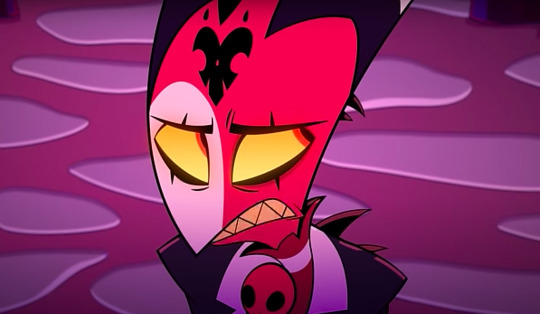
He starts processing the real shit aloud.
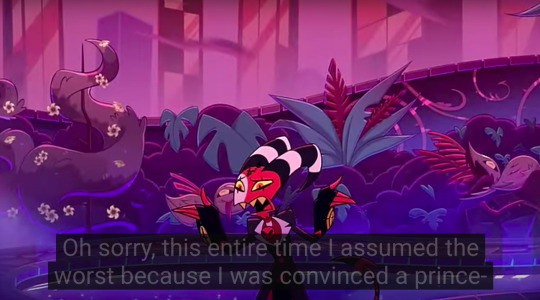
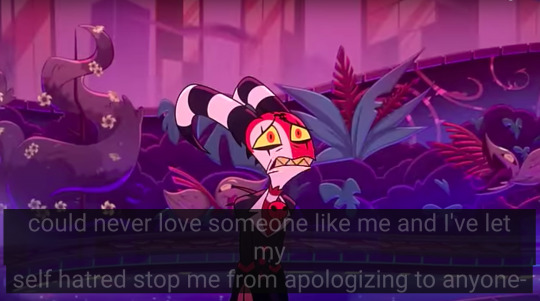
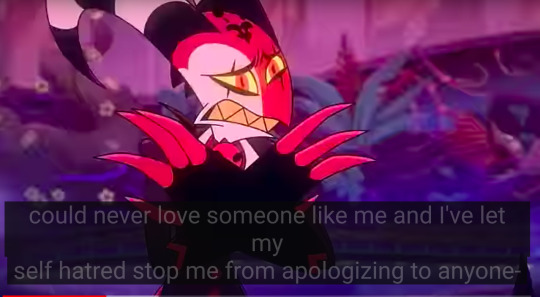
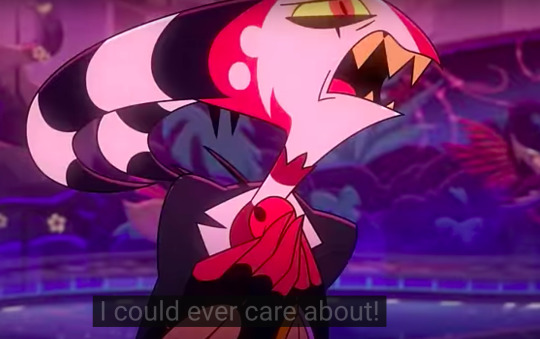
I don't think Blitz has ever admitted this to himself, at least not this articulately and accurately. He needs to say it aloud in order for it to be real. Oops too real.
He's SCARED because he didn't even KNOW he felt this way, but things are becoming very clear and dangerously close to the heart of the matter . . . so he pivots again back into comfortable territory (conflict).
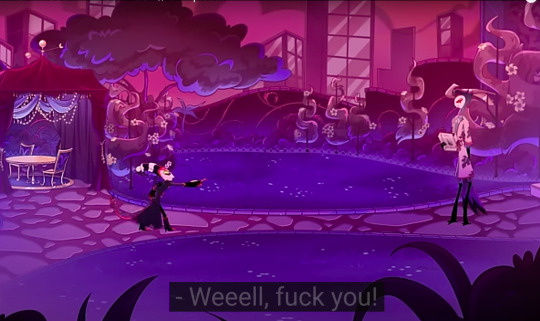
By the end of the conversation, he arrives at a new mission, one that's sort of an equilibrium between his realizations about his honest feelings and his need to have a mission he feels confident in. He's not all confident or all honest- he's still in flux.
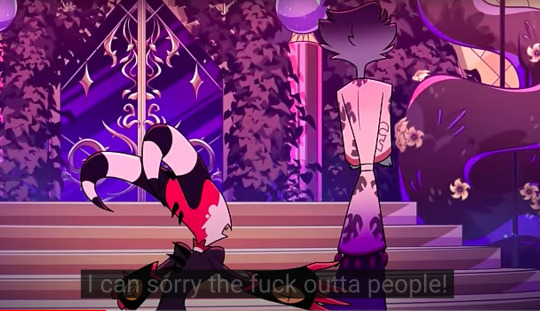
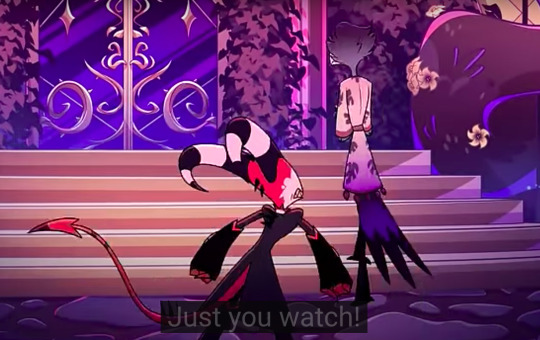
There are SO many more examples of Blitz realizing how he feels BY TALKING (later in Apology Tour when he's talking to Stolas, and then when he's talking to Verosika . . . but then also back in Oops, etc.), but I'm going to leave it at one for brevity here. What's important is that we NEVER see Blitz processing alone. Even in his part of the duet (more on songs in a sec), when he's technically singing to himself, he's consoling himself with a narrative rather than really processing the things that need to be processed.
Blitz needs a person to process with.
But Stolas is an internal processor. We know this already because he made the plan to give Blitz the Asmodean crystal and sat on it for literal months, procuring the crystal, ironing out what he would say, trying to initiate conversations with Blitz, but never explaining how he felt to anyone before it was time- and absolutely NEVER in a way that was half baked.
The way Stolas sings his feelings actually gives us a really clear and beautiful picture of how he processes and figures things out. I forget who said it, but someone on the Helluva creative team referenced a broadway truism that in a musical, characters sing what they can't speak. I think for Stolas it's often what he can't YET speak because he's still processing. He has full honest conversations with himself (Stolas Sings, Just Look My Way), and then when he's face to face with Blitz, he knows exactly what he wants to say. His feelings and beliefs actually progress from song to song- he expresses his awareness of a problem in Stolas Sings and gets more precise about how he feels and what he needs to do about it in Just Look My Way.
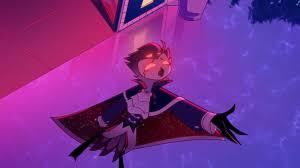
By The Full Moon, for better or worse (kind of both), Stolas knows exactly what he wants to say to Blitz and how he wants to say it.
Even when he's upset, angry, and then drunk, when Stolas speaks about his feelings, he's consistent. He's decided. He loves Blitz. He wants a real relationship. From his point of view, he doesn't care about social class, so he can't understand why Blitz is so stuck on it.
But he's missing something key (it's the social class thing- it's definitely the social class thing), and internally, he's cooking, and we see that (again) when he sings.
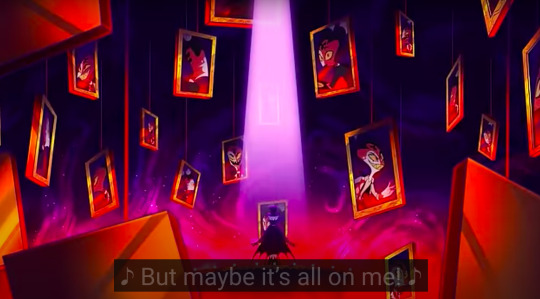
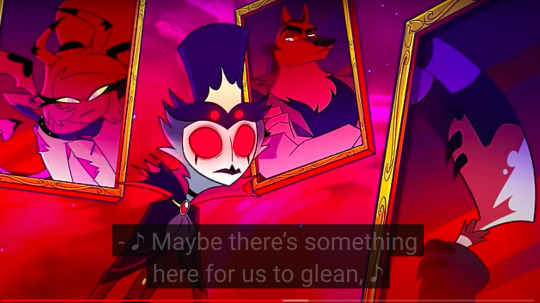
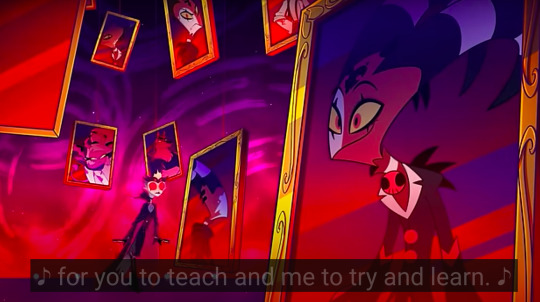
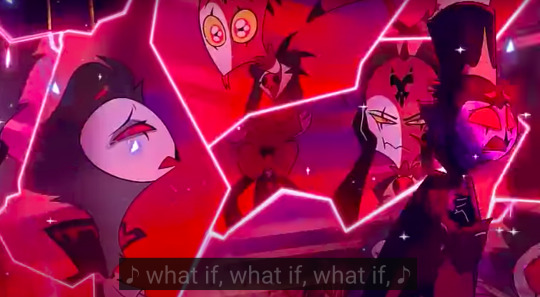
This is the rawest and most in flux stage of his thought process that we've seen. Because this is how he figures out what he thinks and feels- with himself, in song.
Okay- so interesting psychoanalysis- why does this matter to the story?
Well, I think that Stolas doesn't understand that when Blitz speaks in these super emotional, fraught conversations, he doesn't go in knowing what he thinks and feels. He's figuring it out on the fly. He's figuring it out BY talking, and needs to be allowed to do that. Should he do this with a therapist instead of with the person most likely to be hurt by the ideas he flies through on his way to his true feelings? For sure, but this is Blitz.
In turn, Blitz doesn't understand that when Stolas acts absolutely certain and doesn't seem to take in the things Blitz is saying, he's not talking to a brick wall. He's talking to a moveable person who, once he's alone (or singing) is going over and over everything and breaking his thoughts down and reformulating until he arrives at something new.
So . . . it might be a little much to ask these two to understand each other's different processing styles- but they're coming along in their own ways. And I'm looking forward to them understanding each other. Someday. Maybe. Fucking sit down and talk. Slowly. AGH.
#stolitz#my helluva meta#blitz#stolas#blitzo buckzo#stolas goetia#blitzo#Is this the longest piece of meta I've written? Maybe.#Am I missing important details? Absolutely.
296 notes
·
View notes
Text
su-su-su-supernova 🌠🎀
What's good is coming next?
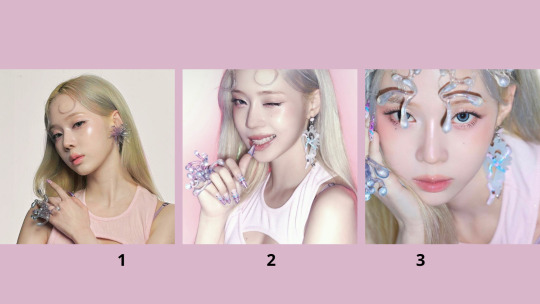
I hope you enjoy the reading! for reflection. thank you 🌠🎀🌌
pile 1: hii pile number 1! all good? a moment of stagnation will be transformed. We see here movement in some area that was previously at a standstill, for your good, for your prosperity in an area. other people can also benefit positively from your prosperity, it could be your family, your friends, your partner, your community; with community work or something like that. We see here a movement towards your own prosperity, to fill your own cup, but it also seems that what comes next will also be very beneficial to others. How intriguing, isn't it? It may be your joy that radiates, because you will return to movement in something that was previously in stagnation, which may even leave you in distress previously, or with internal conflict. This joy that you radiate will be good for you and others around you. Amazing! Another case too, this area that was at a standstill, could actually have something in common with serving others too, it could be about spiritual gifts, working in care, treating people with love and kindness, etc.
In short, something will change, a positive movement in something, a snap, an inspiration, a change perhaps in your well-being, in your energy, which will become more positive. Therefore, you will be able to move something in your situation, in your environment and/or in your life that will be very, very beneficial. both for yourself and for others. Congratulations on this great news, pile number 1! Take good care of yourself, stay hydrated, get a good sleep, ask for help if necessary and you feel like it. thank you! 🌷💌
Cards: I forgot to write them, I apologize my pile number 1.
________
pile 2 - woah! pile 2! you probably went through a tower moment, something changed internally and/or externally. We see here that it is a positive change. With the Lovers Card and the 7 of Cups, you will have many options that will sharpen your eyes! I think there are a lot of love opportunities here, perhaps you are or will be arousing interest in several people and soon you will be able to choose. 👀 hmm, interesting.
Cards: the tower, the lovers, 7 of cups.
Anything else? Furthermore, your ideas and mind will be sharper during this period. allowing you more clarity and good ideas, good projects and also providing you with willpower, inner inspiration. Cards: page of wands, king of cups.
Advice: 10 of pentacles, wheel of fortune. truly accept past events in your life, past cycles. With the work of acceptance, your personal prosperity will flourish greatly. So, accepting and letting go really isn't easy, it can take time, practice - but it's something that can be learned, isn't it? Don't give up, good luck on your healing journey. Seek help and inspiration whenever you want. thank you! take care of yourself, pile number twoo. ❤🌷
________
pile 3 - the sun! oh, finally. some weight will be left behind, recentness, hurt, something you've been waiting a long time to release. It's as if things finally fall into place with ease and a weight is lifted from your shoulders.
In the past, you may have had to choose between two things, with the two of pentacles. Your intuition guided you a lot on this path. I wanted to talk more about the positive things, but I was called to attention. Maybe it would be good for you to reflect on something, write about your feelings, your points that led you to the decision you are making/or made at that moment, if it's your case.
The oracle cards tell you:
love surrounds you. The Spirit is there for you.
There is also more advice from oracles, among them, avoid disorganization; If you feel that you are not capable of something or a mindset, improve yourself little by little and believe that part of you is already like that, the way you want to achieve it - and/or "fake it until you make it" kind of thinking if that is healthy for you and do you good in your situation.
Cheers, pile number 3! ☀☀☀ now is the time to feel loved, free, light and supported by the Universe. "Got your back!" ☀🌼🌱
________
#hope you enjoy :)#tarot community#pick a card#tarotblr#thank you#tarot reading#pick a pile#free tarot#pick a picture
265 notes
·
View notes
Text
Awake late at night after reading that deleted fight between armand & marius, and how it's a chilling parallel of the fight they actually have in tva.
What gets me about how armand reacts to marius' abuse, is how much conflict there is between how he reacts emotionally and physically, vs how he rationalizes those reactions. Emotionally and physically, Armand often expresses anger and violence towards Marius. Thats his first instinct, which immediately conflicts with his deeply seated habit of turning that anger towards himself -of course there isn't any real reason to be angry, he must be the one at fault, he must be the one who doesn't understand, who isn't rational enough. His fantasies of violence are unmanly. He withers under the shame of feeling such righteous anger, because how could it be rational given that marius is the righteous one, always. He's the perpetual pupil, the eternal student, his perception of reality is always subaltern to marius'. That's why he says that he's afraid of loving marius again, because it means having to "learn" from him again -that is, surrender his perspective again.
What I'm saying is that there this idea in the fandom that armand loves marius too much to hurt him, and I went in expecting Armand to act accordingly by fawning constantly around him, but what I actually see in the text is a constant wrestling with his violent urges towards him. Armand reads marius' intentions correctly and is able to verbalize them to marius' face, but marius always deflects by bringing it back to emotions -how could armand accuse him of such things, doesn't he know that he loves him? Armands mind and body are put in an impossible place, between his self protective instinct to hurt this man he was made to love (he was made a "love child" for marius, as per the term he coins himself) to be safe, while being deeply immersed in a constant internal and external dialogue that tells him that this man is wiser, better than him. To me, armand seems one melt down away from attacking marius in many scenes of the book -instead, his rationalization wins out and he becomes despondent and filled with despair, like at the end of tva. It's such a bleak status quo, but i personally believe that there is no way it can continue if marius and armand continue interacting in close contacts, especially after sybelle and benji.
108 notes
·
View notes
Text
♥️Reveling in Richonne - TOWL
#41: The Loving Memory (1.04)

gif cred: @riickgrimes
The Ones Who Live asks the question - what happens when a hero needs saving? And when the hero needs saving from external and internal shackles that have led them to become the most despondent version of the walking dead, it’s not exerting brute force nor attempts at world domination that heals them. No, it’s being loved back to life by the one you were made for and who was made for you.
So that's exactly what happens next. Following Rick finally letting out all his truest emotions after keeping them inside for years, there now comes the outstanding resolution between Rick, Michonne, and the boy who first made them family ❤️🩹...
Michonne again lovingly puts her hands on Rick's face after that just breathtaking profession of pain and love from Rick and stellar performance from Andy.
And then Michonne proves for the umpteenth time that she is the greatest wife, woman, mother, and best friend ever when she takes out a phone with a sketch of Carl on it and ever-so-gently places it in Rick's hand.

gif cred: @nerd4music
Y’ALL. 🫠 How perfect can one episode be? 😭
This was such a beautiful moment and I adore everything about it. I love that even amid her and Rick's conflict in episode 3, Michonne understood how much these phone portraits meant to Rick and so she had one made of Carl after learning that Rick was having trouble remembering his image. It is so heartwarming to know that she worked with Benjiro and got the image of their boy just right for Rick. 🥹 And this was the perfect time to give him this gift.
In this apartment, Michonne essentially gave Rick both his sons back. 😭

gif cred: @taiturner
The fact that she of course got the image right and that it’s one with Carl's eyepatch because that’s their most recent memory of him and they loved him both with one eye or two. 🥲
I also adore the way she places it in his hand and continues to hold onto his arm. So loving. 🥹 The moment really feels like it parallels the way she placed the PRB in his hand earlier in the episode too.
The PRB is what Rick thought would save them but it’s actually the memory of Carl that helps save them and bring them back together. It’s poetic, it’s powerful, it’s perfect. 👏🏽


gif cred: @taiturner
And how fitting that Carl plays this pivotal role in helping Richonne fully return to each other, considering Carl was pivotal to bringing Richonne together years ago as well.
It's like I wrote in a previous post --- Since the moment Rick and Michonne laid eyes on each other, Carl was there helping bring them together and ultimately helping them realize they were meant to be family. And years later, even from the other side, Carl helped bring Rick and Michonne together again. 🥲

(Side note: I believe I remember Danai said she wrote Carl's letter to Michonne as she read it to herself while crying in season 8. And knowing the power of Danai’s pen, I'm so curious about what she wrote in that letter because Danai has always had such a solid understanding of Carl’s importance to Michonne & Rick)

gif cred: @michonnegrimes
When Rick sees this phone drawing, literally seeing his first image of Carl in over eight years, he takes this teary breath and then recalls the memory of holding little Carl’s hand and lifting him up.
And then this episode just wants to full-on sock me in the heart by then showing a memory of Rick putting a hat on the older Carl. 😭

I love the way this indicates that the memory of Carl so quickly returned to Rick and he was able to remember him not just as a little kid but his older version too.
TWD started with Rick doing everything to fight for his boy and then Carl grew up to fight for him too. And now here in TOWL, Rick’s journey is still so deeply impacted by his son. Beautiful.
Rick gives Michonne a teary look as she just did the most invaluable thing ever and gave him his son's memory back. You can really see that it means so much to Rick to finally have the image of Carl come back to his mind. He loves his son so much. 😭 I absolutely adore the way TOWL made regaining the memory of Carl's face a vital element of Rick finding himself again.
And then Michonne gently asks, “If Carl were here right now, what would he say? What would he want you to do with this new chance to be with those you love?” And then I love her little kind “hmm?”

gif cred: @riickgrimes
Even by asking these questions it’s showing that she knows Rick still knows his son. He might have lost the image of Carl for a few years, but he still knows his boy. And Michonne knows he knows what Carl would say and want for his dad. Carl always wanted the best for Rick, and the best thing for him is to be with his family.
And the way Rick looks at Michonne here it really feels like just when he thought he couldn’t fall any deeper in love with her, he just has.
It also makes so much sense why Rick lost the image of Carl because with the CRM he had nothing to tether him to his son besides himself who was under psychological warfare and constant duress. Back at home, Rick had his wife/son’s best friend and mom, his daughter/Carl’s sister, Carl’s grave, Carl’s handprint, and the community Carl grew up in to constantly keep his son’s memory alive. And he could have had RJ too who would have literal traits of Carl.

This just proves yet another reason why it had to be Michonne to rescue Rick. Cuz after feeling he lost Carl, Rick needed to be with one of the people who Carl most lived on through and who could give Carl back to him - or better yet help him realize he never lost his son.
I love the way Michonne has always honored Carl’s memory and how because of that she’s now able to give his memory back to his dad.

gif cred: @jdeanmorgan
And then Michonne has such inspiring rousing final dialogue as she says, “Despite all the odds, all the years, I found you, Rick.” My gosh, the wait was worth it, y'all. 🙌🏽 To hear that line said between Richonne after all the years of waiting. Blessed. 🥹🙏🏽

Then Michonne earnestly says, “I came here through the hell that we have both been through to take you home.” I love that she says the hell they’ve both been through. They’ve gone through so much, and while a lot of it was experienced apart the last few years, that synergistic soulmate connection really makes it feel like they still went through a lot together too.
Like how they both had their worst year ever during the same year - the year Michonne was stuck in a mall after being attacked by the CRM externally while Rick was attacked by the CRM internally when he chose to live dead. Richonne’s journeys like their souls are always interconnected. 👌🏽
I love the music in this moment too as Rick’s breathing slowly steadies and he looks from Michonne to the phone with tears falling. In this moment Rick really gets to grasp how loved he is.
He was fighting so hard on his own but now he gets to hear from Michonne that he was actually never fighting alone because she was fighting for him too. Just like he was trying to get home, she was working to bring him home as well, from setting off to search for him to getting a phone portrait of Carl made for him. 🥲

gif cred: jdeanmorgan
And then Michonne says, “You think that’s all for nothing?” And when she says that they cut to Rick who again has one of those expressions that make it so clear that Alive Rick has the wheel. Like Dead Rick is no more and once again he’s come alive both through and for Michonne.
Michonne says, “For us to just go our separate ways?” Richonne intentionally going their separate ways genuinely feels like an impossible thing for them to do and for me to even wrap my head around. It's simply not an option for these magnetic soulmates.
And then Michonne is beautifully glowing under the TOWL-improved lighting as she wipes a tear from Rick's face and smiles as she assures him, “No. We go home, Rick.”
The way she says that. 😭 This episode holds the record for the number of times my heart bursts. And I love that we now have multiple scenes of Richonne wiping each other's tears over the years. 🥲

Then Michonne continues, “And we figure out how to protect it together.” Michonne knows their home will still need protection from those outside forces and threats. But what she knows even more is that she and Rick can succeed in protecting their kids and their home if they’re together.
Rick looks down and then I adore the way Michonne lifts up his head and says, “That’s how we make it all make sense.”

I've always felt like the one who makes the most sense in the world to Rick is Michonne. Everything about her just resonates with him on a deeper level. She can always help him see clearer and that was crystal clear in this scene as well.
And I love how Michonne holding Rick's head up at this moment reminds me of when he hung his head in his TWD 9.05 hallucination and she lifted him up there too. Now he gets to experience the invigorating spirit-lifting presence of Michonne in real life again, and I love that for him. 😊

Lastly, Michonne tells Rick one of my favorite lines when she says, “We love on each other as hard as we can while we can.” I love that that’s the final dialogue of this masterpiece of a scene. It’s a beautiful sentiment. 🥹
And I actually like that they don’t ever end up saying “We’re the one who live” within the miniseries because while it’s true and a great motto, I think this show took on an even more grounded and layered exploration of what happens when you stop living or when you become scared of the love of your life inevitably no longer living.
So instead, Rick and Michonne now know even if we don’t live - our love does.
They're the ones whose love lives. Their love lives on forever, and so long as they’re alive they know they shouldn’t run from that. They should love on each other as hard as they can during the valuable time they do have. That’s just so special to me and so I adore that they conclude this by deciding not only to go home but to allow their hearts to love each other as robustly as they’re meant to.

With Michonne saying this it's essentially saying - even if we don’t have forever, we can make the time we do have feel like it if we live in this love wholeheartedly.
And then I adore the way she puts her hand on his face with a tear so lightly fallen against her skin and looks deep in his eyes with that precious smile. That moment just felt like she saw him. She finally saw and reunited with her Rick. The search is over, y’all. 🥳 She found him for real this time. And that makes my heart so warm to see her know that Rick is with her again just from looking into the love of her life's eyes. 🥰

gif cred: @richonnegifs
You can see the “there he is” moment and truly the acting Danai and Andy can do with just their eyes alone is profound.
Then it’s Andy’s turn to express so much with just his eyes when Rick looks at Michonne with the warmest teary eyes as he has so clearly gotten his entire life from her words, just like old times. Except this time he pretty much literally got his life back through her.
I love the way he looks at her like if his heart for her got any bigger it would pop. I know after this he’s more convinced than ever that Michonne is perfect to him and the love of his life.
I adore seeing him gently put his hand on her face like she’s the greatest treasure in all the land. His look just felt like ‘there she is. I see her fully now and I know she’s worth choosing even over the fear of losing her.' Having her is his life’s reward. 💯 And he's finally ready to embrace that reward again and return to life with her.

gif cred: @richonnegifs
I believe you fall the deepest in love in a relationship where you know you’ll fall and be caught.
Rick and Michonne are able to be so fully invested in, immersed in, and enwrapped in this love because they know they can fall this deeply and unabashedly and always be caught and lifted up.
It also makes me think of the Toni Morrison quote - “I didn’t fall in love, I rose in it.” I feel like that applies to Rick and Michonne so much.
Finding this vibrant and synergistic love with someone as respectable and resilient as Rick made Michonne heal and be all of herself again after so much had been taken from her. Back in TWD, Michonne knew she was able to rise out of the dead state she had been in thanks to being brought back by Rick. And Carl too. 🥲

And Rick found the best version of himself in finding love with someone as radiant and remarkable as Michonne. She met him at a time when he was understandably really struggling mentally. But then he found her and found a partner capable of lovingly walking with him through both the best and hardest seasons of life. And a healed Rick arose from their love.

Now here in TOWL, Rick knows he has risen from the dead through Michonne's love. He's fully aware that despite trying to stay dead, the love of his life has successfully resurrected his spirit and made him come alive again.
And after the two have poured their heart out and he’s regained the image of his eldest son with her help, he’s no longer trying to fight being alive. 🙌🏽 He can now leap back into life and know with Michonne by his side, he'll be caught. And Michonne can do the same and be caught by him now too. 🥹 And they'll rise up against anything else that comes their way.

Then, I absolutely love the kiss that punctuates the end of this immaculate scene. 🤩
The visual of it is beautiful with Richonne matching in black. It really feels like the two of them being in this black is almost like Richonne had to both traverse through the CRM’s dark hold but after being vulnerable they’re now here on the other side. Together.

gif cred: @lousolversons
As always, I love those single Richonne kisses and this one is of course gold. We got us a couple who can go from their freakiest kiss to this utterly wholesome kiss all in one setting, y'all. 😇
And the intimacy of the way they touch before and after the kiss and stay looking into each other's eyes with a smile as they finally agree to go home. We truly witnessed them restore each other back to life through the greatest Richonne heart-to-heart ever. 🥹

gif cred: @nerd4music
These Richonne heart-to-hearts always bring them back, from TWD to TOWL. 🙌🏽



One last time I just gotta say - this ep 4 scene again solidifies why the only person capable of bringing Rick home was Michonne. Because Rick didn’t just need a literal rescue but a physical, mental, emotional, and spiritual revival. He didn’t need to just be brought back home, he needed to be brought back to life. And there is no better person on the planet to do that than the woman who is his heart.
For years, Rick and Michonne had gone without feeling a part of their own heart because they’d been apart. But now in this transcendent moment, after feeling the beating pulse of the heart they share, addressing their physical and internal scars, reflecting on their children, and reconnecting in every way, they feel complete and alive again after years of existing with half their heart miles away.
When I tell you this whole scene - from making love at the start to kissing with tears in their eyes at the end - felt like Love itself chose to take on a physical form and the form it chose was Richonne...

Somehow calling these moments perfection doesn’t even feel like it does it justice. This was everything and more and I adore it endlessly. #LovePersonified.
When I think about why I love Richonne, why all these years I’ve spent all this time reflecting on these two’s love story…it’s this series of events right here that captures it completely. I love the story of these soulmates because Rick and Michonne have the love supreme and it is forever a joy and an honor to behold. 😇👌🏽
#richonne#towl#reveling in richonne#1.04#RIR (41)#the ones who live#twd towl#michonne grimes#rick grimes#rick x michonne#twol#michonne#rick and michonne#twd: the ones who live#twd#richonnefandom
92 notes
·
View notes
Note
Why do writers love to torture their own characters?
One word: conflict.
Conflict is the chef’s kiss in a story. The secret sauce to writing from plot to scene level. And the real reason a reader will enjoy your story and character.
I love pretty prose and world-building, but both will only get you so far. Because writing is so much more than just writing. It includes the art of storytelling. And that requires conflict. For without conflict, your story lacks content; regardless of your story length, genre, writing style, and subject.
What is conflict?
In its simplest form, conflict is when a character confronts an obstacle that hinders them from reaching their goal.
This obstacle can be as large as Thanos wanting to erase half the population in the universe, to something as small as a farmer out fishing and realizing he’s out of bait. It also ranges in use. Conflict can become a major plot point in a story–such as the main antagonist causing your hero to hit an all-time low–or it can also be a quick beat in a scene with two characters having an argument.
There are two types of conflict in a story: external and internal. External conflict is what happens between your character and their outside world (think main external plot), while internal conflict is what happens between your character and themself (their inner struggle, or character arc).
Conflict is everywhere in storytelling, and on paper, it’s a simple concept to understand. And yet, sometimes, it feels like it requires total mastery to write it.
Conflict must be meaningful to your story and character(s). The obstacles must help move your story forward, move your character to determine a new plan to reach their goal–and create growth and change for the character, too.
A central conflict exercise
What major obstacle does your character face that creates your novel’s plot?
Why does this central conflict matter to your character?
Does the central conflict force your character a reason to get involved with the plot?
Does the central conflict raise high personal stakes for your character?
How will your character’s goal keep them involved in resolving the plot?
Does the central conflict affect your character’s personal flaw?
What lesson does your character learn to overcome the central conflict?
Does the central conflict connect with your character via identity or backstory?
Does your central conflict allow your character an arc of change or transformation?
How does your character resolve or fail to resolve the central conflict at the end?
Want more detail? You can read the full post at the link below!
#writeblr#writing community#writing tips#writers of tumblr#writers#creative writing#writing#creative writers#writing inspiration#writerblr#writing resources#writing advice#writers on tumblr#ask novlr#writer#amwriting
93 notes
·
View notes
Text
I feel like one unexpected side-effect in the (slight) uptick of queer ships becoming canon (seriously guys it's so slight if you look at the actual numbers) is learning how often slash fandom doesn't actually want the baggage that comes with their ship becoming canon.
I mean, of course they want it. The fandom wants the confirmation that they're not delusional, that they're not mocked, that the sparks they sensed between two possibly-queer characters is real.
But the side-effect of a ship becoming canon with anything more than a kiss to mark the end of the story is that it might become canon not in the way you wanted.
So long as the characters are in the will-they-won't-they, you can imagine what their first time would be like. You can imagine how they act in a relationship together. You can imagine the tone of the relationship.
You can imagine it in ways that are incredibly personal and meaningful to you.
But the minute a ship becomes canon at a point where the story still needs to progress, you're going to get divergence from the way you imagined it going.
They're going to bicker about things you never imagined would be a point of contention between them in the story, that it might have even been meaningful for you that they had never fought over previously, possibly because the story just didn't have the time for them to fight over that beforehand. Or perhaps this writer leans more into interpersonal conflict as a plot point, where you preferred the couple facing an external threat. There's as many ways to imagine the tone of a relatinship as there are people in the world.
They're going to have a different first-something than you imagined. First kiss, first date, first time sleeping together. For it to be canonical it has to be committed to the page which means it has to be set. Maybe you thought it would be awkward where it was smooth, or smooth where it should be awkward. Maybe you though the kiss would be a bigger deal to them than the sex or vice versa. Maybe canonically they flub the romance of that first time for the sake of comedy. Now that's canon too. You can ignore it with fic, obviously that's what fandom is about, but now it's AU, not "what-if?".
There might be interruptions to the love story, breakups, fights, separations, that aren't the end of the relationship but do mark an action beat that is necessary to keep the story moving and interesting. Unless the last canonical beat is them riding into the sunset together, it's inevitable and usually marks the end of a story because domestic fluff where nothing happens isn't actually a genre that can be sustained in original fiction without a plot.
Look, as queer ships become canon, this is going to be inevitable. OFMD S2 was the most egregious example I've seen recently of everyone who had engaged with the fandom having a different version of how they wanted Stede and Ed to behave once they were together. I couldn't help but laugh when I saw that the fandom fervency shifted from the canonical established queer ship (after it had the audacity to move beyond the establishing kiss and then the will-they-won't-they phase of reuniting), to the potential of a character who was never even canonically established as queer (Izzy) because everything about his story still lived in the potential land that fandom thrives in. And I don't entirely mean that as a criticism, just as a bitter irony!
Fandoms don't necessarily want a ship confirmed, they think they do, but that potential which was so enshrined and infuriatingly drawn out with regards to queer ships for so long and that's only just barely breaking just a little from when it was outright forbidden to show queer characters getting together (and it still is in most of the world if you go by population, and heavily discouraged by the mainstream powers that be in most places even where it's not banned, the limitations on international markets you get from having canonical queer characters even as side characters still makes it prohibitive for big budget flicks, since it means cutting themselves off from those markets in terms of recouping costs.)....
ANYWAY the point I'm making is that a few queer ships becoming canon has led to a perhaps predictable but depressing amount of outrage when 1) a popular queer ship doesn't become canon, but that's been building for a while now, but also 2) when the popular ship becoming canon doesn't become canon in the way the fandom wanted. Which was also inevitable but goddamn as a veteran of fandom for over two decades now, I can remember not that long ago when your queer ship becoming canon just not in the way you hoped would have been a damn nice problem to have!
196 notes
·
View notes
Note
How do I decide on a setting for my story? I've come up with a character conflict but not sure what kind of setting it would fit. I also still have holes in the conflict, like how it happened, who the character actually is and how their life is. Any tips on how to approach all of this? How to make it all connect?
Guide: Finding a Setting to Go with Conflict
A Word About Conflict
When talking about plot, "conflict" refers to a problem that must be resolved. More specifically, it's a problem that must be resolved by your character, but there are obstacles they must overcome along the way.
There are two types of conflict in plot: internal and external.
Internal conflict refers to a problem within the character's heart and mind. Some examples would be an inability to trust others, lacking a sense of belonging, or shouldering an unnecessary burden of guilt.
External conflict refers to a problem in the characters situation, life, or world. Some examples would be a murder mystery, a natural disaster, or trying to find a buried treasure.
Plots can be "character-driven," meaning they are driven entirely by internal conflict, "plot-driven," meaning they are driven entirely by external conflict, or they can be both. Many stories these days are both, meaning that the characters are driven partly by internal conflict (and a need for change) while they tackle the external conflict.
How to Figure Out a Setting
1 - Examine the conflict for clues. Some conflict ideas are really general like "I want my character to solve a murder mystery." Well, that could be set pretty much anywhere. Other conflict ideas are more specific, like, "I want my character to learn to trust again after a contentious divorce." That's probably going to be a more contemporary story, so you would be looking at a more modern, real world setting.
2 - What settings appeal to you? If you're looking at a more general conflict that doesn't have requirements related to time or place, look instead at the settings that interest you the most. Do you want to write a story set in Victorian England? Or maybe the Wild West? Or maybe far-future on a space station near Mars? When the sky's the limit, you can afford to indulge your interests.
3 - What genres are you most familiar with? If you still find yourself unsure, consider the settings of genres you're most familiar with. For example, if you read a lot of YA fantasy, you have a pretty good grasp on imaginary magical worlds, to that might be a setting you consider.
4 - Develop your character further. Although setting often informs character, it's also okay to flesh out the character first and see where that leads you. Sometimes a setting becomes apparent just based on the needs of your character or what you imagine for them.
5 - Use a setting generator. If all else fails, there are quite a few great setting generators that will help you come up with a setting. You can also try a random place/location generator.
6 - Where have you always wanted to go? If someone handed you a crystal and said, "You can use this to travel to any time and place, real or imaginary," where would you choose to go? Might that be a fun setting to try for your story?
Stay tuned for part two where I tackle the other part of your question!
•••••••••••••••••••••••••••••••••
I’ve been writing seriously for over 30 years and love to share what I’ve learned. Have a writing question? My inbox is always open!
♦ Questions that violate my ask policies will be deleted! ♦ Please see my master list of top posts before asking ♦ Learn more about WQA here
91 notes
·
View notes
Note
Hi I have read many of your James posts and so far I agree with all of them. What gets me wondering however is someone like Lily Evans - potrayed as the saintly morally good character - dating someone like James - an entitled bully who kept his jerkish behavior even after he supposedly changed. Who do you think she was? Did she excused James's behavior because she found him attractive and thought she could change him? Or that he would change for her? Was she downplaying his faults because she fell in love? Or was she simply too naive? I cannot believe a person who would marry a person with so many faults like James wouldn't also be far off from being jerkish themselves. And what about her relationship with Severus? Was she as attached to him as he was? Why was she friends with him for so long if she was excusing his prejudice for years? I'm so conflicted about her. The author implies she is something but the text kind of goes against that. As someone who is pro snape and knows Lily was a big part of his life what do you think about her, her motives, actions or relationships? I love your opinions a lot btw never stop sharing them😄
I looove to talk about Lily because her character sucks. And not because of her, but because HOW Rowling portrays her. Sooo.. Lets go! Lily is emblematic of a significant issue in the series: the tendency to use female characters as tools for male development rather than as complex individuals with their own arcs. In Lily’s case, her character functions primarily as a moral barometer—she exists to reflect the “goodness” or “badness” of the men around her. Her choices and relationships with James and Severus are less about her own desires, values, or growth and more about how they impact these two men. This framing does Lily a disservice, stripping her of agency and interiority while simultaneously burdening her with the narrative role of deciding who is worthy and who is not
Rowling’s portrayal of Lily is heavily idealized. She is the perfect mother who sacrifices herself for her son, the brilliant and talented witch who stands out even among her peers, and the moral compass who chooses “good” (James) over “evil” (Severus). This construction paints her as infallible, a paragon of virtue, and the embodiment of love and selflessness. However, this saintly image is rarely interrogated within the text.
The problem lies in the dissonance between how Lily is presented and the decisions she makes. If she is meant to represent moral perfection, her marriage to James —a character whose flaws remain evident even after his supposed redemption—creates a contradiction. James, even as an adult, retains the arrogance and hostility that defined his youth, particularly in his continued disdain for Snape. If Lily was as discerning and principled as the narrative suggests, why would she align herself with someone whose values and behavior contradict the ideal of Gryffindor bravery and fairness?
This contradiction weakens her role as a moral arbiter, making her decisions feel less like the result of her own judgment and more like a narrative convenience to validate James’s redemption. By choosing James, she implicitly forgives or overlooks his past bullying, signaling that his actions were excusable or irrelevant to his worthiness as a partner. This not only diminishes the impact of James’s flaws but also undermines Lily’s supposed moral clarity.
Lily’s role mirrors a common, harmful trope: the woman as a moral compass or fixer for flawed men. Her purpose becomes external rather than internal—she isn’t there to pursue her own goals, ideals, or struggles but to serve as a benchmark for others’ morality. It’s as if Lily’s worth as a character is determined solely by her relationships with James and Severus rather than her own journey.
By failing to give Lily meaningful contradictions or flaws, Rowling inadvertently creates a character who feels passive and complicit. Her saintly veneer prevents her from being truly human, as real people are defined by their contradictions, growth, and mistakes. Yet Lily is static, existing only to highlight James’s "redemption" or Severus’s "fall."
This lack of depth reflects a broader issue with how women are often written in male-centric narratives: their stories are secondary, their personalities flattened, and their actions only meaningful in the context of the men they influence. It’s a stark reminder of the gender bias present in the series, where women like Lily, Narcissa, and even Hermione are often used to drive or validate male characters’ arcs rather than having their own fully developed trajectories.
Regarding Lily and Severus relationship, their bond begins in a world where both feel alienated. Severus, growing up in the oppressive and neglectful environment of Spinner’s End, finds in Lily not only a companion but a source of light and warmth that he lacks at home. For Lily, Severus is her first glimpse into the magical world, a realm that she belongs to but doesn’t yet understand. Their friendship is symbiotic in its earliest stages: Severus offers Lily knowledge of her magical identity, while she provides him with acceptance and validation. However, this connection, while powerful in childhood, rests on a fragile foundation—one that fails to evolve as their circumstances and priorities shift. When they arrive at Hogwarts, the cracks in their bond begin to surface. While Lily flourishes socially, Severus becomes increasingly marginalized and becomes a frequent target of James Potter and Sirius Black. This social isolation only deepens his reliance on Lily, but for her, this dependency becomes increasingly difficult to sustain.
It’s important to recognize that Lily’s discomfort isn’t only moral; it’s also social. By the time of their falling out, Lily has fully integrated into the Gryffindor social circle, gaining the admiration of her peers and, most notably, James Potter. Her association with Severus, now firmly positioned as an outsider and a future Death Eater, risks undermining her own social standing. While her final break with Severus is framed as a principled decision, it’s difficult to ignore the role that social dynamics might have played in her choice.
It’s worth considering that Lily’s shift toward James wasn’t necessarily a sudden change of heart but rather the culmination of an attraction that may have existed all along, one rooted in what he represented rather than who he was. James Potter, as the embodiment of magical privilege—a pure-blood, wealthy, socially adored Gryffindor golden boy—offered Lily something that Severus never could: validation within the magical world’s elite.
Though Lily was undoubtedly principled, it’s plausible that, beneath her moral convictions, there was a more human, and yes, superficial, desire for recognition and security in a world that was, for her, both wondrous and alien. Coming from a working-class, Muggle-born background, Lily would have been acutely aware of her outsider status, no matter how talented or well-liked she became. James’s relentless pursuit of her, despite his arrogance and bullying tendencies, may have been flattering in ways that bolstered her sense of belonging. James’s attention wasn’t just personal—it was symbolic. His interest in her, as someone who could have easily chosen a pure-blood witch from his own social echelon, signaled to her and to others that she was not only worthy of respect but desirable within the upper echelons of wizarding society.
This dynamic raises uncomfortable questions about Lily’s character. Could it be that she tolerated James’s antics, not because she believed he would change for her, but because she enjoyed the social validation his affection brought her? Interestingly, this interpretation aligns Lily more closely with her sister Petunia than one might initially expect. Petunia’s marriage to Vernon provided her with the stability and status she craved within the Muggle world. Both sisters may have sought partners who could anchor them in environments where they otherwise felt insecure. For Petunia, that meant latching onto the image of suburban perfection through Vernon. For Lily, it may have meant aligning herself with someone like James, whose wealth, status, and pure-blood background offered her a kind of social and cultural security in the magical world.
If we view Lily’s relationship with James through this lens, her character becomes far less idealized and far more human. Rather than being the moral paragon the series portrays, she emerges as a young woman navigating an uncertain world, making choices that are as practical as they are principled. While it’s clear she disapproved of James’s bullying, it’s equally possible that his persistence, confidence, and status were qualities she found increasingly difficult to resist—not because they aligned with her values, but because they appealed to her insecurities.
It’s also worth noting that Lily’s final break with Severus coincided with her growing relationship with James. This timing is telling. Severus, a social outcast from a poor background, represented the antithesis of James. By cutting ties with Severus, Lily not only distanced herself from the moral ambiguities of his choices but also from the social liabilities he represented. Aligning with James, by contrast, placed her firmly within the Gryffindor elite—a position that would have offered her both social protection and personal validation. And this whole perspective is much more interesting than her image as a moral compass for the men around her. Unfortunately, as with many of her characters, Rowling didn’t put any effort into giving us definitive answers; she just insisted on that unhealthy, idealized view of motherhood and the idea that everything is forgiven if you're on the "right" side and rich and popular.
Sorry for the long text, but whenever the topic of Lily comes up, I tend to go on and on, haha.
#lily evans#lily evans potter#lily potter#lily evans meta#lily potter meta#james potter#severus sname#pro severus snape#snapedom#severus snape fandom#harry potter meta#harry potter
45 notes
·
View notes
Text
Some thoughts on unreliable narrators as I procrastinate on writing several tricky scenes with unreliable narrators:
Every narrator is unreliable. Just like there's no such thing as 'objectivity' in journalism or academia, there's no such thing as a truly reliable narrator. The narrator's viewpoint is limited, they're shaped by their culture and personality and experiences, they overlook things and make assumptions. It's all a matter of degree. But usually we talk about "unreliable narrators" when the gap between what the narrator says and what the reader/author believes to be true is prominent enough to be narratively significant.
Where is the gap?
Unreliable narrators are not all duplicitous. In fact, many are telling the truth as they understand it. But some are not! This is by no way a comprehensive taxonomy of narrators, and even within a single story there are likely to be shifts and overlaps, but here are some Types I find helpful to consider:
Oblivious The reader doesn't get crucial information because the narrator simply was not paying attention. Maybe they were missing context. Maybe they were bored. Maybe they were distracted by a hot girl (Gideon I love you). Alternatively, the reader gets clearly false information (especially about how other characters are thinking or feeling) that the narrator wholeheartedly believes to be true (Breq I love you).
Repressed You the reader can tell that what the narrator's telling you they think/feel and what they actually think/feel are not the same, but the narrator themself has no idea. For narrators that lack self-awareness and don't understand why they do the things they do or for narrators that are really good at not looking at things that make them uncomfortable.
Liar (internal) The "Sure, you keep telling yourself that, buddy" version, where the narrator is on some level aware that they're lying to themself but doubles down on it anyway. Tends to involve a lot of rationalizing or misdirection. It's very common for a character to have a realization about something important partway through a story (that The System is corrupt, that they're in love with their best friend, that their actions are actually more self-serving than altruistic, etc) that makes them switch between Repressed (passive internal conflict) and Liar (active internal conflict). Or, you know, they might have a realization and not immediately start lying to themself about it, but where's the fun in that?
Liar (external) Usually shows up in first-person stories or in-universe writing, since it requires the narrator to be aware that they have an audience and be attempting to intentionally mislead them. In this case, there is a deliberate disconnect between what the narrator's understanding of events and the account of it they're giving for the purpose of spin or deception.
Coerced This is where the gap comes from an external factor, usually magic or sci-fi nonsense that messes with a character's mind and changes their perception of themself and/or reality, (eg they can't talk/think about a certain subject, they've had their memories altered, etc). It's a different flavor than the other sorts of unreliability and can overlap with any of the others depending of how aware the character is of what's been done to them.
How Obvious Is The Gap?
Another thing to consider is at what point, and to what extent, a reader becomes aware that a narrator is unreliable. Is it clear from the beginning? Is it played as a reveal? Is is a slow dawning realization? Is it something that you could overlook on a first readthrough that only becomes obvious once you put the pieces together? All of these can be effective, but it's good to know going in. If you want the narrator's unreliable nature to be a reveal (that is, there's a point where the reader realizes that they're lying and that recontextualizes the whole story), you're going to approach it differently than if you want your readers to be screaming about the dramatic irony from the beginning. If your point is that the reader shouldn't actually know how much of what the narrator's telling them is true, that's going to look very different than a story about a narrator who has an on-page realization about one of the big things they've been lying to themself about and has to navigate the consequences.
#writing#posts that are just me rubber-ducking at myself because i don't want to actually write the Hard Things#(one fic that's just All Repression All The Time with shades of Liar (internal) and one scene that's. um.#coerced dramatic-irony-horror slide from repression to liar while screaming)
313 notes
·
View notes
Text
I was discussing with a mate what actively makes a piece of media Queer as opposed to just featuring same-gender attraction.
I am a big fan of Queer being a verb as well as an adjective.
I wouldn’t call Romeo and Juliet queer because while it’s transgressive within the frame of the narrative, it’s *not* transgressive within the wider cultural framing? A young hetero couple from different sides of a conflict being married was so incredibly acceptable that it was a long-established practice for establishing peace - to the extent that the Friar even mentions that within the text as part of his reason for facilitating the marriage outside the strict norms of parental consent and acceptance?
Plus the whole framing of choice-led marriage as a force for societal harmony was such an influential trope at that particular period, particularly within Elizabethan England’s newly Protestant culture? Virginity was no longer prized the way it had been in a more Catholic culture, nor was the remote idealisation of courtly love. Instead you get a young different-gender couple who choose *married love*. In the context this was written, this was almost the *opposite* of Queer.
I’d say that, for a text to be Queer, it needs to not only transgress both norms internal and external to the text, but also flip those norms in a way that actively invites the reader to reconsider those norms in a new light? It’s why I’d call so many of Shakespeare’s comedies queer in a way Romeo and Juliet isn’t, because, even though everything goes hetero at the end to fit theatrical conventions about comedies ending with a marriage, they are this space where gender becomes fluid and playful, and *that’s* what you walk away with the impression of from the play? The hetero endings are so enforced it’s kind of deliberately ridiculous?
It’s why I feel Queerness includes readings and depictions of disability that aren’t any of the standard boxes that it is so often shoved into in media. If a disabled character isn’t “inspiring”, or “pitiable”; if they’re not artificially helpless, or completely unaffected by their disability, and, more than anything, if *they* are the centre of the text, with genuine agency, and the text is about *them*, not about their effect on abled characters, that definitely queers a text to me.
And *more* so if it centres their desires and their desirability as a character. Not that they can’t be asexual; asexuality is *very* queer, but if they are not *artificially* desexualised, as disabled characters so often are.
#queerness#queer art#queering art#queering literature#disability#shakespeare#romeo and juliet#early modern literature
135 notes
·
View notes
Text
Companions in DA2 and in Veilguard
Since I first played DA2, I noticed the structure of the whole team:
There was a set of characteristics and views: race, experience of injustice, position on magic, position on blood magic, position on law, etc.
Every companion had something in common and something radically at odds with other companion.
E.g.: Anders and Fenris had very similar experiences and views on oppression and injustice. However, they had radically opposing views on magic.
Fenris and Merrill were both elves and faced common prejudice against them as elves in particular, but again, magic and also blood magic.
Anders and Merrill were both mages, but they were at odds about blood magic.
etc. etc., these are just companions I liked most). So, the general emotion about them was not that they were mean to each other, but "if only they could find a common ground on that one thing!" - but these issues were so big they could never truly overcome it. It was a very internal struggle between what in reality was a group of people with similar views on most things.
Part of Hawke's tragedy was that they themselves did not have similar first-hand experiences, and therefore were blind to why their friends cannot just be friends.
In Veilguard, it is external conflict. Companions are professionals, they know the task, they understand the necessity of being a team.
However, each of them has a mirror character, an antagonist of their personal story. I also saw a post which I unfortunaelt lost immediately where they are also paired with the Evanuris (Lucanis with Elgar'nan, Emmrich with Falon'din, Dirthamen with Neve, etc.). I think, this structure of Evanuris pairing is also quite solid.
So, every mirror character is something like "What I could have turned into if I made other choices":
Davrin is put against Isseya. They were both protectors of griffons, they were both very loyal - and kind and loving! - Grey Wardens. Isseya to Davrin is what would have happened if he took these qualities to extreme. What his kindness could turn into.
Emmrich is put against Johanna. They were friends, they strived for the same thing, they had similar interests. For Johanna their common goal turned into "whatever the cost" at some point. Emmrich could have become her, too. That's how his curiosity, his intellect could turn to.
etc. etc.
So here we have good character - what they could be (if they were mean to each other lol) - ultimate sacrifices and twisting themselves (the Evanuris)
Which serves several major narrative themes:
regrets and overcoming regrets;
primal drives of people/spirits (kindness, curiosity, wisdom, etc.) and how they can be twisted (big nod to Solas)
Also it fits into Lighthouse and eluvians (don't lose yourself in reflections! - says on of the notes in the Crossroads).
This is the game about reflections - about seeing yourself in others and wondering what could have been. And the pinnacle of these themes is relationship between Rook and Solas.
#dragon age veilguard#dragon age lore#dragon age 2#rook#davrin#solas#emmrich volkarin#merrill#anders#fenris
33 notes
·
View notes
Text
Syd & Carmy- Romantic Beats
Preface:
Studying this I see the second season uses steps 3-7 since we had our chemical equation and met cute the 1st season. You'll see gif examples 3-7 that show the beats of the season two.
Billy Mernit defines the “seven basic romantic comedy beats” in his book Writing the Romantic Comedy. I'm observing that writing a romcom for a TV series is like a rollercoaster for beats, taking curves and dips that keep the series at a pace where the viewer is guessing. So beats repeat themselves and set themselves up for the next season.
The romantic beats are described as--
1. The Chemical Equation - The setup, there's something wrong in the protagonist's life. There's a missing piece in the main character's story. This is where we identify the protagonist's external and/or internal conflict.
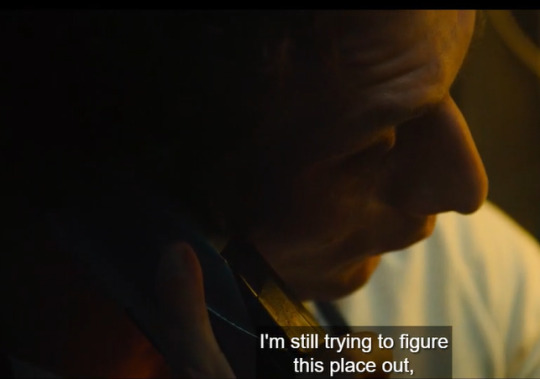
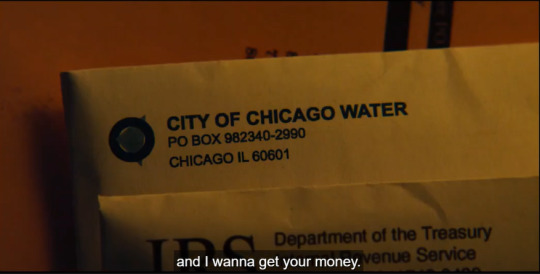
2. The meet cute or catalyst - The incident that brings them together - and this should relate to the theme of the story. This meeting sets the tone for their relationship.
When the secondary lead is introduced- there should be some hints that this romantic interest is the missing piece of the Protagonist's chemical equation.
The Bear: I'd also add that with romantic comedies, the meet-cute should have some humor in it. (What’s UPS, is that in Chicago, or?) . As we talk on this platform- the meet cute was the proper example of a romcom.
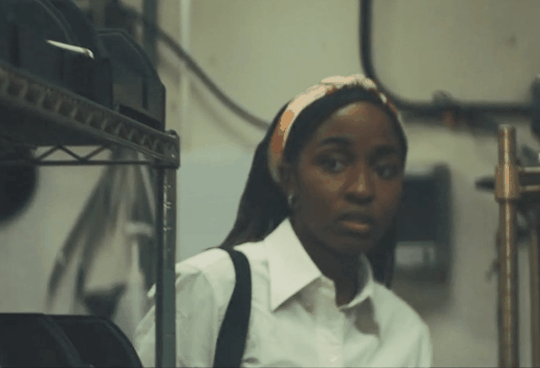
3. The Sexy Complication -This is the first proper clash between the heroine and the hero. Higher stakes define the main character's goals. Typically, the external problem keeps them apart, or you can use internal conflict that keeps them apart. Traditionally occurring at the end of Act 1, a new development that raises story stakes and clearly defines the protagonist’s goal.
Season One episode Three: Syd is officially the sous chef and has a hard time with the staff. She comes in with the intention of changing The Beef for the better, however, Carmy is stuck in his old ways and past toxic experiences in the kitchen.
Season two episode three: The first clash starts 2x03 Sundae, after their technical meet cute- 2x02 pasta showing new closeness for season 2, however After 2x03 Sundae we see repeats of the sexy complication- since Syd and Carmy's relationship is the plot of the show- the stakes rise as the pressure to open The Bear is approaching and Claire comes into the picture- causing a bigger complication between Syd & Carmy.
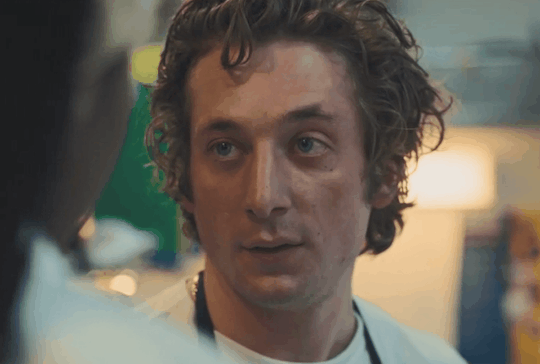
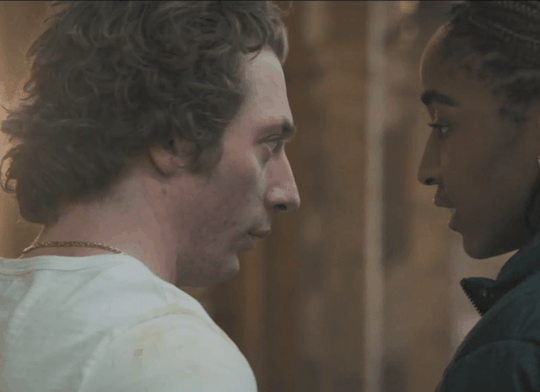
4. The Hook. The midpoint scene sticks the two characters together. There's no way out, and this should reflect the theme of the movie.
This hints at the outcome of the relationship and gives hints of the potential between the two characters. There can be sexual tension involved or a detailed moment that shows the two characters are becoming closer.
Season one episodes Three and Five: Syd and Carmy reach an understanding and episodes three and five show vulnerability as Carmy reveals his brother was an addict and Syd shares the failure of Sheridan Road catering.
Season Two Episode Nine: After complications, Syd and Carmy reach a moment of understanding. This is the most romantically suggestive scene with prominent sexual tension.
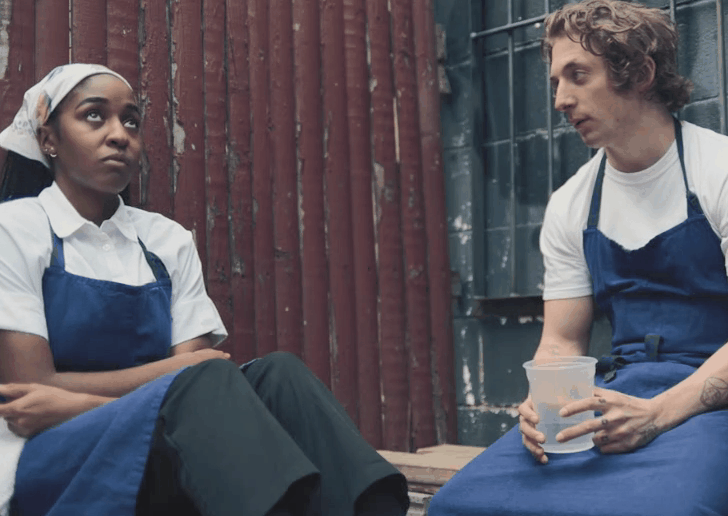


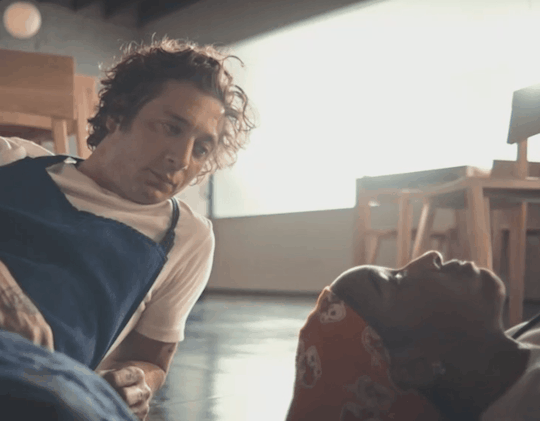
5. The swivel - This is the moment after the hero and heroine have become closer, when their conflict comes back again, in a different form. a turning point that makes the stakes higher and hurts the main character's goal, or vice versa, leading to a changed goal. The main character is forced to choose between love and the goal.
Season one and two: in both seasons Carmy loses his cool with Sydney. The first season she walks away and the season two Syd calms Carmy down.
What's interesting is that the song Spiders (kidsmoke) by Wilco plays in both scenes giving us hints of parallels.


6. Dark Moment – This is the consequence of the swivel. The characters have to reveal private motivations, and it seems that either the love or the goal is lost forever. The main character is at their most vulnerable point.
Season One Episode 8: The revealing of private motivation occurs in 1x08 When Carmy is in al-anon. He reveals that his trying to fix the restaurant was him trying to fix the relationship with Mikey. At this point, love (Sydney) and the goal (fixing my relationship with Mikey) are lost forever. The vulnerable point is Carmy facing the chaos in his internal world.
Season Two Episode 10: I'm a fսckin'... I'm a fսckn' psycho. That's why. That's why I'm good at what I do. That's how I operate. I am the best because I didn't have any of this fսck¡n' bullshit, right?
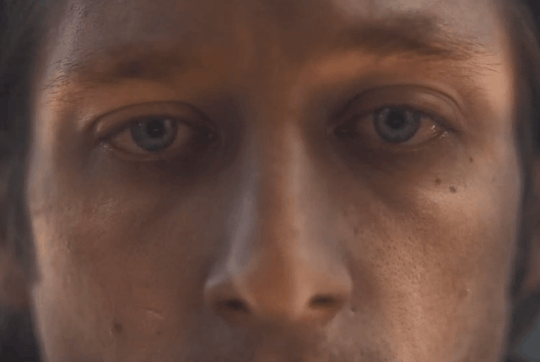

Wherein the consequences of the swivel decision yield disaster; generally, the humiliating scene where private motivations are revealed, and either the relationship and/or the protagonist’s goal is seemingly lost forever.
7. Joyful Defeat – reconciliation between the characters that remind the audience how important the relationship is to them, usually (but not always) with a happy ending that implies marriage – but usually at the cost of something the main character has had to sacrifice.
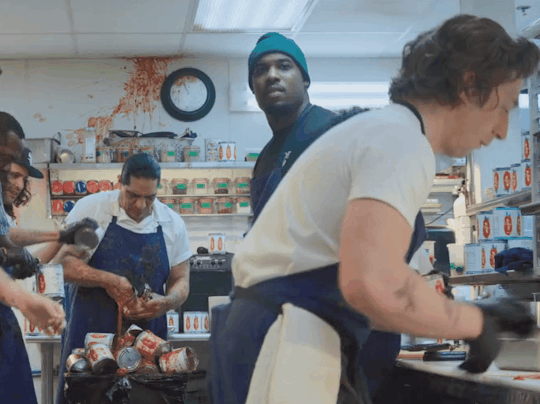
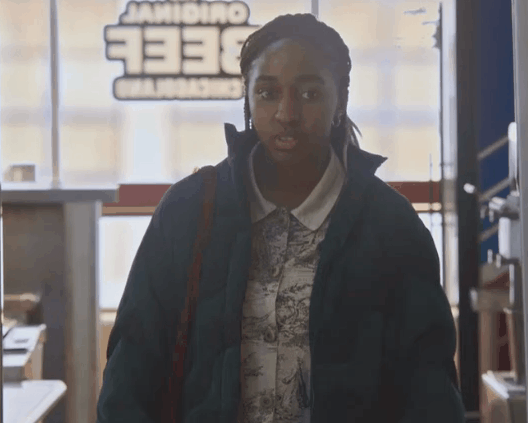
Season One Episode 8: Two tops? Booths?
Nuff said.
Season two: We're left with a cliffhanger for the Joyful defeat. Will the reconciliation happen in season three? Will we have a happy ending and what will Carmy sacrifice? Will he choose love or the goal? Will Syd choose love or the goal of getting the star?


Oh the slow burn is real! Storer, what are you doing here? This is a romcom!
#sydcarmy#carmy x sydney#carmy and sydney#chef's kiss#the bear meta#the bear#the bear fx#sydney adamu#carmen berzatto#carmy berzatto#the bear spoilers#sydney x carmy#platonic and messy#charged and sexy#thoughtful chaos posts
267 notes
·
View notes
Text
just finished Arcane season 2 & how could something be so good, and yet so bad? Felt like a yoyo because the writers clearly knew what they were doing, but they wouldn't have been able to take the wild swings they did without Fortiche's production strength. If s1 got around its 9 episode limitations by being lean, spare and hyper-focused, s2 goes wildly in the other direction, a maximalist "bang-for-your-buck" approach that clearly favours the animation. Like Riot always knew that Fortiche was their trump card but i dont think even they could predict how quickly and massively beloved the studio's house style would be. So the plot feels like it's structured both to set up future shows, but also to give Fortiche every single opportunity to flex their skills. Its a season that's intensely cinematic and layered in the ways it visually conveys the external action and the internal psychology of its characters. But this maximalist approach to animation is something im getting slightly tired of - post spiderverse fatigue i guess (to put it simply). But the production isnt as insufferable as ATSV was, partly because all of the characters are a stronger emsemble, but also because the operatic multiverses, timelines etc all feel like a shell to hold the characters vast feelings about themselves & each other. Like the mechanics of time travel are meant to hold Ekko's twin loves of Zaun & Jinx; even the worldending Arcane mumbo jumbo is meant to express Jayce & Viktor's love of each other, of these two men going on a journey of discovery and work together, and where that journey ends.
the problem with the high-concept, big-feeling approach is that it blows away everything that s1 worked towards - namely that this conflict was about two sisters, and two cities. Zaun becomes a passenger to the story. So much gets picked up & left behind. The deep foundation that s1 set up gets built on in patchwork, and very few characters feel like they're written to their full potential. I also think that making Viktor the final boss was frankly ridiculous - why should his journey to heal himself lead him to such a hyperbolic end? Jayce's speech about why Viktor was fine the way he was would be great in any other context - in this context, it neatly sidesteps that there were structural reasons for Viktor's illness. But ofc, when your writing barrels towards the abstract, all kinds of structural, tangible world-building gets left behind.
Much to love (Ambessa, Mel & Ekko's storylines, even Jinx's kinda worked) - and i'll forever love this show for writing black characters that fully take part in the politics and magic of their world. But boyyyy what a crazy rollercoaster. The only consistent act was act 1, and then act 2 & 3 were ping-pong in terms of quality. Eps 4 & 7 were soo beautiful, but what followed them - yikes 😬. Those godawful "music" videos at the start of each ep (so glad they dropped that gimmick in act 3!) & I'm still not over how jarring that Vander flashback w/ Silco & Felicia was. Like wtf.
23 notes
·
View notes
Text
ouroboros rambles chapter 2
you guys seemed to like the chapter 1 rambles, so here is chapter 2!
[spoilers for isat and twohats below the cut]
i would like to start by saying that we all need more mirabelle POV fics in our lives. she deserves only the best.
I always really liked how Mira didn't just. get over act 5? like, the things that siffrin said were hurtful! yes! and she loves him! even after that! but it doesn't erase the pain and the conflicting feelings regarding it, especially because of the no-spoilers rule... which we will get more into i proMISE! in any case I was focused a lot on the fact that Mira post canon is dealing with a Lot, what with everyone still believing that she was chosen by the Change God and yknow. saving Vaugarde, and Siffrin's overall condition doesn't help! She wants him to be okay and safe, and she has already shown that she feels immense guilt over not being able to help siffrin during the loops, so I kinda leaned hard into that.
The entire party is about to be So Tired Of People.... especially The Introverts (Odile, Mira, and Siffrin)...
The fucking cart thing came to me out of fucking nowhere. I have no idea where or why that bit came around.
Siffrin sleeping habits analysis. siffrin sleeps all curled up like a cat most of the time? theyre small scrappy, but not really the most physically strong (before the loops), and i imagine more than a few years of traveling alone would train him to be ready to protect themselves however they can, even in their sleep. I think that this eases up a bit as they get comfortable with the party, which leads to them being able to sleep "normally". but of course, that is how they wake up in the loops. negative association and trauma from waking up back in the meadow..... i don't imagine they'll be going back to that any time soon.
I do have a Full Catalog of Siffrin's injuries (because im actually insane) but that will be talked about in my chapter 3 rambles. for now though, all im gonna say is that Siffrin definitely kept the stars hidden. In my headcanon, healing craft only works when you can actually pinpoint a wound, internal or external. I'm more inclined to believe that siffrin healed them up the best they could on their own after to hide them.
Ohhhh odile. my beloved. i have so many feelings about her and how she processes siffrin's issues postcanon. feelings i will not get into until next chapter. sorry lmaoooooo. All you gotta know for now is that once she starts seeing things, she can't stop. the signs appear everywhere, and she very quickly puts the pieces together from that point. All it takes is one domino to start the cascade, and Odile is the kind of person that WILL get to the bottom of it all, no matter what it takes.
Mira's guilt. Oh man. There are some ways in which her and Siffrin are very alike, and this is one of them. She's justified in being mad, yes, but that doesn't erase the fact that she doesn't want to BE mad. She hates it. because she knows now that siffrin was suffering. She defeated the king, saved vaugarde, but the cost was her friend's health and happiness. siffrin said that they were happiest they'd ever been with the party... and yes, siffrin loves them all deeply, but she never could have wanted that love to come at such a great price.
Mira has gotta be TIRED. girl healed siffrin a grand total of (checks my page of notes from act 5) six times. with very little cooldown. and that was AFTER deflecting the ONE SHOT KILL attack from the king (which, even with the carrot method shield, does at least 1/4 damage) and unfreezing siffrin....ough. let her rest!
i love torturing isa using his crush. its so funny. bro is a disaster. brain completely short circuits at the thought of siffrin in his clothes i can IMAGINE IT SO CLEARLY.... odile is gon abe homophobic soon /silly
Siffrin's wish... this scene was really important to me. Just for clarification (and this will become a LOT more obvious later), I don't really regard this scene as Siffrin getting over what happened? Because he definitely isn't. But they have already literally let go of their wish, and I wanted to explore a more… intentional version of that? its long-lasting effects are still there, mentally and physically. it doesn't just go away. But it has served its purpose and this is my way of showing the transition point from the loops and their future with their family.
Also!!! the idea of mourning something that no longer serves its former purpose, a life you cannot get back. Siffrin can never go back to who they were before their wish. They have been fundamentally changed as a person. And while the wish did bring good things, the flipside is that it also dismantled their entire worldview and life in its entirety. They died from this wish, suffered because of it, but the meaning behind it remains, and i think that this scene kind of shows the idea that siffrin still feels compassion for what it originally meant to them. its a bittersweet reality.
#in stars and time#isat#in stars and time spoilers#isat fic#in stars and time fanfic#isat spoilers#ramblings#fanfic#ao3 fanfic
26 notes
·
View notes
Note
I am writing a semi-slow-burn romance fiction where characters A and B never met each other officially but know about each other through rumours.
~Character B fell in love at first sight with character A~
When they meet officially, how should I show their growing relationship or connection without it looking forced or fake?
To show a growing relationship or connection between characters A and B in your romance fiction, it's important to focus on building their bond gradually and authentically. Here are some tips to portray their relationship in a natural and believable way:
Genuine interactions: When characters A and B finally meet, allow their interactions to unfold organically. You can show them engaging in meaningful conversations, sharing thoughts, and discovering common interests. Their conversations can start off tentative and gradually become more open and comfortable as they get to know each other better.
Emotional depth: Explore the emotional depth of their connection. Show moments of vulnerability, where they confide in each other or share personal stories. By revealing their fears, dreams, and insecurities, they can develop a deeper understanding of one another and forge a strong emotional bond.
Shared experiences: Create opportunities for characters A and B to engage in shared experiences. This could include going on a memorable outing, embarking on a common project, or facing a challenge together. Through these shared experiences, they can build trust, rely on each other, and develop a sense of camaraderie.
Subtle gestures and chemistry: Highlight subtle gestures and non-verbal cues that indicate their growing connection. It could be a fleeting touch, a meaningful glance, or a shared smile. These small moments can convey a sense of chemistry and attraction between the characters, deepening their emotional bond.
Conflict and tension: Introduce realistic conflicts and challenges that they need to navigate together. Conflicts can arise from misunderstandings, differences in values, or external obstacles. The way they handle these challenges can demonstrate their ability to support and understand each other, leading to growth in their relationship.
Inner dialogue and reflection: Provide insights into characters A and B's inner thoughts and feelings. By revealing their internal dialogue and reflections, you can show their evolving perceptions of each other and the emotional impact the relationship has on them.
Subtext and unspoken communication: Incorporate subtext and unspoken communication to add depth to their interactions. Characters A and B may have moments where they understand each other without explicitly stating their feelings. This can create a sense of intimacy and mutual understanding that builds their connection.
Remember, the key is to show the growth of their relationship through authentic interactions, emotional depth, shared experiences, and gradual progression. By focusing on these elements, you can portray their connection in a way that feels genuine and resonates with readers.
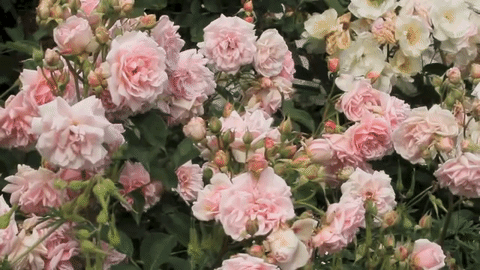
#writerscommunity#writer things#writers#writersociety#on writing#writblr#writers on tumblr#creative writing#writing#writeblr#writer#write#writings#writers and poets#female writers#writing stuff#writing community#writing prompt#writing advice#novel writing#writing inspiration#writing ideas#world#writing a book#writer community#writer problems#writer stuff#writer on tumblr#writers block#ao3 writer
38 notes
·
View notes
Text
Daily thread about BridgertonS3 and today is all about Polin and their relationship (although I'm going to do a couple of posts about other characters as well).
So, the question becomes what makes them such a good couple? I have a theory about this, and that kind of works for many of my ships.
So, my theory is that Polin is such a good couple because they have similar values but different ways of manifesting in their life. What does this mean?
If you look at Colin and Pen, you see they are very similar in what they believe in (it's what makes their friendship work in the first place). They believe in love, in connections, they believe in be kind and supportive.
They both know what's like to live a life when you have to put an armor on. Different reasons for that, but they both know what's like to hide part of themselves to the others. They both have similar insecurities around themselves and struggling to find their identity in the world.
Of course, they manifest this in different ways, both because of the circumstances surrounding them and because of the society norms around their respective gender. Colin puts this fake rakish persona on (and Pen clocks on this in 0,1 seconds). Pen uses LW to shield and empower herself.
But then, both of them have this connection between them that's honest and real. Pen is basically revealing herself in episode 2 (it would be suspicious if she had no reported this). Colin even in episode 1 goes back on his steps and adopt his real self around Pen. They don't have to lie around each other. But they do, because they are still insecure.
Bringing the romantic elements to their relationship means adding a level of complexity, because for both of them it's about discovering what real intimacy feels like. Even if Colin is the "experienced" one they are both virgins in terms of an experience that goes beyond the physical moment.
But then, of course, to realize their full potential, they have to truly abandon their fake personas. The conflict is both internal and external (which makes for a great story) because they have to grow each other, as individuals, and grow together in their relationship.
I would have loved to see more what their intimacy feels like when they have both shed their armors, because if it was explosive before, post healing from their respective scars, it would have been superb.
They are layered and real, they both make mistakes and learn from them. Their friendships adds to their romantic love for each other and it enhance in both the best version of themselves. And in each other they find strength, confidence and support. They are the perfect example of what a real partnership looks like. That's why so many people connected with them. This is what a deep, secure, healthy love story looks like, and in that, allows us to see what we may want in our life too.
#polin#bridgerton#bridgerton season 3#polin meta#polin positivity#colin bridgerton#penelope featherington#colin x penelope#bridgerton meta#polin analysis#daily thread about BridgertonS3#otp: how fast the night changes
42 notes
·
View notes